The ambiance was joyous as postgraduate researchers within the department of Education came together in July 2024 at the Eastern Gateway auditorium to celebrate and share their research endeavours and personal experiences over the past year, at our Doctoral Researchers’ Annual Colloquium. Within the department, we have home and overseas, part and full-time postgraduate researchers enrolled on professional doctorate (EdD) and PhD programmes, pursuing an eclectic range of disciplines and subject areas spanning the continuum from early years educational settings to higher education and beyond.
Those who delivered oral and poster presentations of ‘work in progress’ include doctoral researchers at the early stages of their research journey as well as those nearing completion and submission of their final thesis. A collaborative, safe and supportive environment was very much in evidence throughout this all-day event as constructive feedback comments, sought through live question and answer sessions combined with anonymous online survey responses, provided much support and challenge for one another.
We are always thrilled to discover how coming together at our annual Colloquium affords multiple opportunities for networking and brokering professional working relationships, particularly in areas of mutual interest, personal aspirations and need. To exemplify these happenings, we learned about how some doctoral researchers from overseas have successfully gained access to local research sites and research participants to move their own doctoral research studies forward whereas others have effectively secured next steps in their career progression, within academia and beyond.
A well-received highlight was the keynote address by Dr Lesley Nelson-Addy entitled Patience & Perseverance: Some reflections on finishing your PhD/EdD thesis. In her own research, she investigated the experiences of Black British undergraduate students studying English and/or History at Russell Group universities and considered how the concept of Black Survival – informed by Kehinde Andrews and Audre Lorde’s scholarship – enabled participants (including herself) to engage with the process of ‘finishing’ their degrees in predominantly White, academically and socially élite spaces.
The selection of Colloquium abstracts presented below (with authors’ permission) provides a snapshot of the diverse ways in which our doctoral researchers produce and contribute new knowledge within their chosen fields.
Lewis Fogarty: Why should you be an advocate for Early Years Education and Care?
The Early Years (0-5 years old in England) are the most formative years in a child’s life with multiple research findings indicating the importance of the first 1000 days, starting from conception. It can also be said that if we get early years right, we can spend the rest of young people’s education building on that, but if we get it wrong, we spend the rest of young people’s education trying to recover from it. Despite this, Early Years Education and Care is subject to consistent under-funding and is routinely undervalued both societally and politically. More needs to be done to raise the awareness of this stage of education and to reverse the damage done to the sector in the past 30 years.
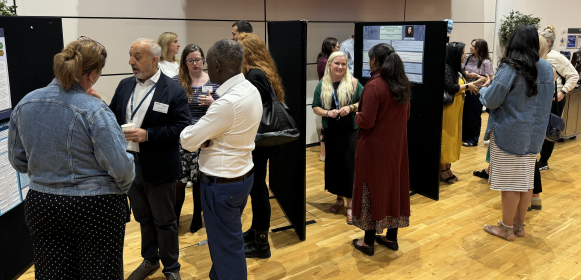
Qualification levels in the sector are dropping, recruitment is harder than it has ever been, and settings are closing at an alarming rate. My research focused on what can be done from within the sector to help resist the current situation. This is centred on professional confidence: being aware of injustices and confusions in the sector and actively correcting them through thoughtful and skilful advocacy for collective action, working towards a better future for the Early Childhood Education and Care workforce and children. Good leadership requires personal characteristics of empathy and open-mindedness. It also requires focusing on solutions that draw on a range of up-to-date knowledge to meet the needs and interests of all stakeholders. It seeks to promote professional confidence and to develop contextually relevant practices.
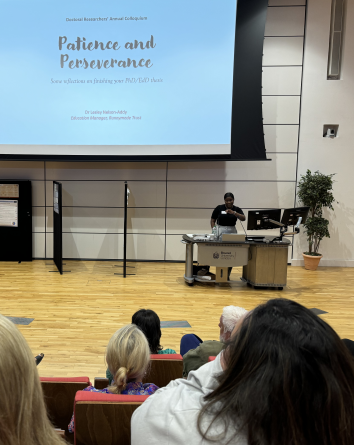
Elenor Paul: The Impact of Craft Activities on Year 6 Pupils
Year 6 pupils face a multitude of new challenges: transition to secondary school, SATs tests and prepubescence. This thesis investigates how craft activities can foster a positive learning environment and enhance pupil development, contributing to various aspects of primary education. This mixed-method study, combining quantitative questionnaire data with qualitative observational data sought to capture the experiences of pupils from various backgrounds and learning styles.
Early findings highlight the multifaceted impact of craft activities on student learning:
- Strengthen academic skills: enhance fine motor skills, spatial reasoning, and problem-solving abilities, all of which play a crucial role in academic development.
- Boost social and emotional learning: foster communication, teamwork, empathy among students, bolster self-confidence and resilience.
- Increase engagement and motivation: provide a fun and interactive learning experience, promoting a positive classroom environment and intrinsic motivation.
- Support sustainability: reusing and repurposing materials breathes new life into old objects, develops creativity and resourcefulness, reduces environmental impact and promotes appreciation for sustainability.
The findings advocate for incorporating regular craft activities into primary school learning. By harnessing the power of craft activities, teachers and educators can equip Year 6 pupils with not only essential skills but also the confidence and resilience needed to thrive in secondary school and beyond.
Kellie Brown: Black, Female and Leader in Secondary Schools in London
Retention is lower for ethnic minority teachers than for white teachers at all responsibility levels. The ‘drop-out’ rate for black teachers is higher than it is for other ethnic groups, and the recruitment and retention of black teachers is a challenge for the profession in the UK. There are specific challenges in multicultural London where there is continued recognition for the need to have diverse representation in schools (Tereschenko et al. 2022). Drop-out is particularly evident among black female leaders, but understanding of the precise causes and consequences of this phenomenon in London schools remains limited, due to the lack of specific research relating to black teachers’ recruitment and retention (Moorosi et al. 2018).
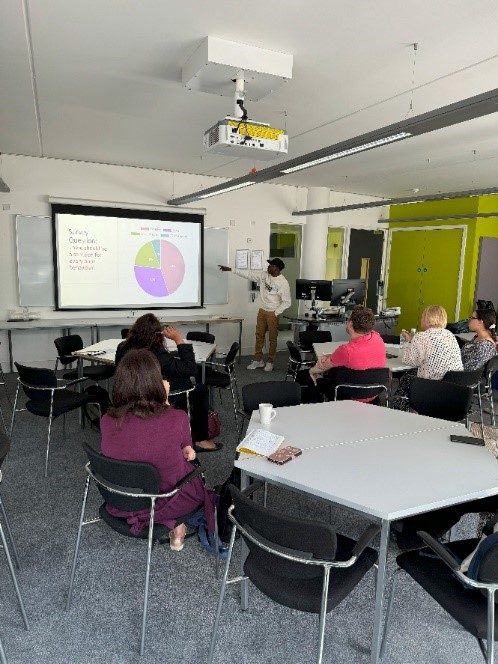
This presentation will draw on doctoral work undertaken in London secondary schools investigating leadership experiences of Black Female teachers at different junctures in their professional and personal trajectories with analysis supported by the work of Showunmi (2022) and Miller (2020). Informed by Black feminist theory (Clemons 2019), an intersectional framework of privilege and disadvantage, and Critical Race theory, this research highlights the intersectional complexity of the experiences of Black women navigating the politics of education and white patriarchal structures in the private and public domains of multicultural London. The original theories used in assessing intersectionality for black women have been embraced and explored through the work of Hill Collins (2019), hooks (2014) and Crenshaw (1991).
Raj Kakaiya: A decade of Degree Apprenticeships
Introduced in 2015 as ‘an innovative new model bringing together the best of higher education and vocational education’, degree apprenticeships (DAs) are employer driven and integrate learning new skills on the job along with academic knowledge provided by universities. Apprentices are employed, and training is embedded into their role – all age groups, existing employees and new recruits can participate in these programmes, through their employer. The strategic benefits (‘Golden Threads’) of DAs include tackling priority skills gaps to increase UK productivity and drive economic growth; widening participation by appealing to those not suited to ‘traditional’ higher education routes; social mobility; greater workplace diversity; personal and professional development; and University’s civic mission.
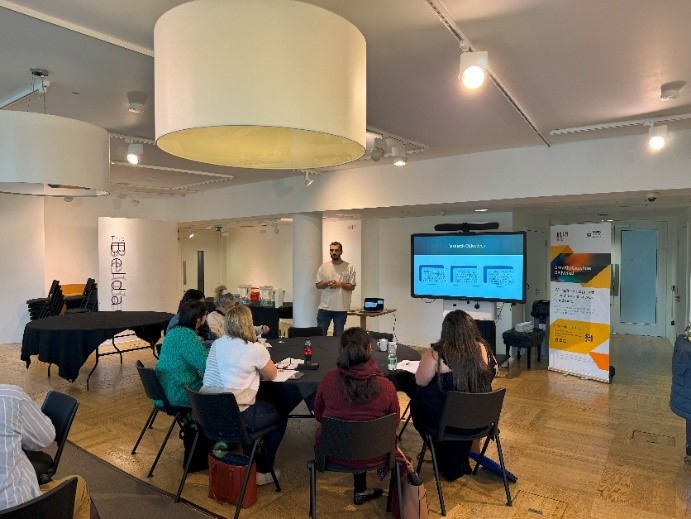
The potential benefits of DAs are therefore multifaceted, and this literature review uses a chronological approach (over the last decade of DAs) to identify and review government policies, reports, sector publications, expert views, funding deliberations, and statistics. It critically assesses whether these ‘Golden Thread’ benefits have been realised, and how the findings can be reflected against a new emerging Government skills and industrial strategy. One of the review’s guiding purposes will be to address key questions and criticisms of DAs; to consider future sustainability along with the transformational potential for the economy, communities, employers and individuals. It will also consider how DAs could or should be more integral to the University offer across a larger proportion of UK universities, reflecting on recent Office for Students incentives to invest in DA development
Lesley La-Croix: Social Workers' Professional Development and Organisational Cultures
This paper reports on emerging findings from a study to address how newly qualified social workers' perceptions of their profession evolve as they progress into more autonomous practice. The backdrop of recruitment and retention challenges within social work set the context for this inquiry. The departure of thousands of social workers from the profession alongside numerous unfilled vacancies underscores the urgency of understanding the factors influencing social workers' career trajectories.
Using a qualitative approach grounded in critical theory, this study examines the experiences of early career social workers during the first two years post-qualification. The research includes observations of assessed and supported year-in-employment (ASYE) group sessions across two different Local Authorities and in-depth interviews with 15-20 newly qualified social workers to provide rich insights into their perceptions and experiences.
Findings suggest a shift towards prioritising staff well-being and fostering positive relationships with managers within organisational cultures. Moreover, an emphasis on career progression and ongoing learning opportunities beyond the ASYE year signals more integrated and supportive approaches to staff development. The study also explores the sense of belonging and connectedness influencing social workers' decisions regarding long-term commitment to their roles.
The theoretical framework draws on Freire's notions of empowerment, hooks' theories on liberation and oppressive practices, Foucault's perspectives on power, and Ritzer's concept of the McDonaldization of social care services. By shedding light on the interplay between social workers' perceptions, organisational cultures, and professional development, this research contributes to a deeper understanding of responses to social inequality within practice cultures and broader societal contexts.
Maggie Stephenson: A Critical Autoethnography of Parents of Children with Special Educational Needs and Disabilities (SEND) in England
Being a parent is often seen, from a range of perspectives, as a great and unquestioned gift. However, caring for a child with SEND can often be a challenging journey, and does not always meet this widely held view. Parents of such children often face challenges arising from their medical, developmental, educational, and social needs. The physical and psychological distress parents face in relation to the caring responsibilities can have a long-term impact on their quality of life (QoL).
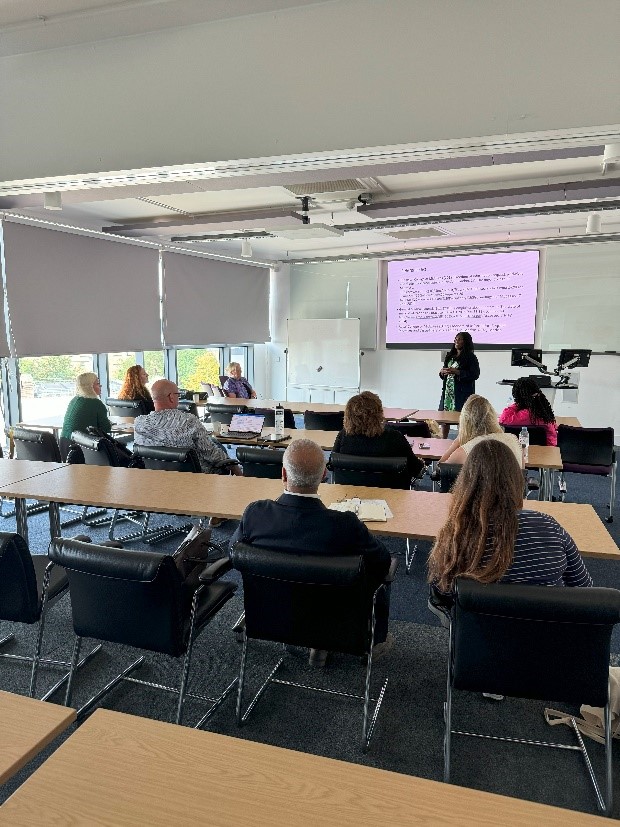
This study will explore positive and negative impacts of QoL among parents of children with SEND in England through semi-structured interviews and written narratives informed by their lived experiences. In close conjunction with the Capability Approach, participants will be guided by the six domains identified by the World Health Organisation (WHOQOL, 1998) as imperative for a well-rounded QoL namely: physical, psychological, level of independence, social relationships, environment, and spirituality/religion/personal beliefs.
The Critical Autoethnographic qualitative research approach will also draw reflexively on my lived experience as both insider and an outsider. The research will use Interpretative Phenomenological Analysis to examine participants’ accounts and establish Personal Experiential Themes and possible Group Experiential Themes to inform policy and practice.
Dr Paula Nadine Zwozdiak-Myers, PGR Director, Department of Education